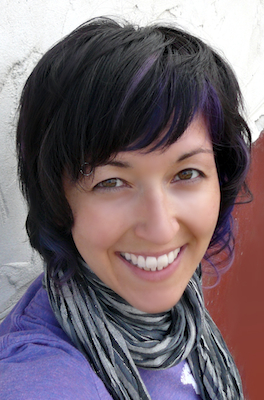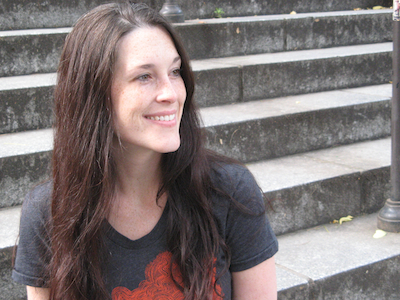An introduction to Sharon McGill, Heather Miller, Nana K Twumasi, and Jessica Wickens, the editorial team that publishes the literary journal Monday Night. Open submissions are held from September to December. The idea to start Monday Night came out of a writing group where Jessica Wickens and Sharon McGill first met. The debut issue of the journal published in 2001.
Quick Facts on Sharon McGill (SM), Heather Miller (HM), Nana K Twumasi (NKT), & Jessica Wickens (JW)
- Monday Night website
- Home: SM – Denver, Colorado; HM, NKT, & JW – Oakland, California
- Comfort food: SM – Fried chicken, mashed potatoes, corn, maybe some macaroni and cheese, and a tall glass of milk with ice; HM – Hearty soup, especially if someone else has cooked it. And chocolate, always; NKT – soup; JW – Anything involving unwise amounts of cheese.
- Top reads: SM – David Foster Wallace, Lorrie Moore, Junot Díaz, Jonathan Franzen, Lydia Millet; HM – A Gathering of Old Men by Ernest Gaines, The Taste of Country Cooking by Edna Lewis, What is the What by Dave Eggers, Me Talk Pretty One Day by David Sedaris, The Spirit Catches You and You Fall Down by Anne Fadiman; NKT – Toni Morrison, Kurt Vonnegut, Tom Robbins, L Frank Baum, & Mary Gaitskill (For the time being!); JW – Favorite poets: Cesar Vallejo, Erin Moure, Denise Newman, Emily Dickinson (poems and letters). Prose: Marilynne Robinson’s Housekeeping (or Gilead, or Home, depending on which day you ask me); Moby-Dick by Herman Melville; The Scarlet Letter by Nathaniel Hawthorne.
- Current reads: SM – I just finished Luka and the Fire of Life by Salman Rushdie. I’m kind of in the mood for a collection next, so I’ll probably read All Over by Roy Kesey; HM – Brooklyn by Colm Toibin, The Mind’s Eye by Oliver Sacks, & John Steinbeck’s The Grapes of Wrath; NKT – Two Girls Fat and Thin by Mary Gaitskill; JW – Drood by Dan Simmons
What are you working on currently at Monday Night?
The 10th anniversary double issue of Monday Night.
Who do you picture as the ideal audience for Monday Night?
Someone who’s really open-minded. There’s probably a wide variety of readers, maybe because there’s been so much diversity on the editorial team. It’s hard to picture one type of person who would like everything in each issue. It’s nice to imagine the people who find the journal in a bookstore and don’t know any of us.
Where and when do you prefer to read submissions?
SM: I haven’t read general submissions since Issue 5, but I used to set a limit, say 3-4 hours, and blast through as many as I could. At first, I read everything start to finish, but by Issue 5, if the first few pages didn’t interest me, I stopped.
HM: Usually a coffee shop, although most of my Monday Night reading was at a British-style pub in Oakland. If I stayed long enough, I could transition from tea to beer without even changing seats. I tend to be most productive early in the day or in the late afternoon, but I am hopeless past 8 o’clock at night.
NKT: I usually read at my apartment; I pick one weekend day and give myself a certain number to do so that I don’t get overwhelmed. I try to give each piece a fair shake by reading it all the way through, but if I get through the first page or paragraph even, and nothing strikes me, I put it in the “no” pile. I used to feel bad about it (and as a writer, knowing other people do the same to my work stings like none other), but I also read slush as part of my job and the best advice a boss gave me was to read the first paragraph and be done with it if it didn’t strike me. I also thoroughly ignore statements in bios about where the writer studied or obtained their MFA, which awards they’ve won or been nominated for, and where they’ve been previously published. I don’t care about those things. I do care if the story is a good one, or at least shows potential.
JW: On the couch, on Saturday or Sunday afternoon, with a hot tea or a cold beer, depending on the weather. I also often read submissions in airports and on planes, because much of the final reading work happens during the winter holidays when I usually travel to visit my family.
How many submissions do you receive for a given issue? How many get published?
We get about 300 submissions per reading period, and publish around 12 pieces in each issue.
What do you look for in the submissions you select for publication?
“Language is important,
and it doesn’t need to be complicated.”
A good story. Good writing. Language is important, and it doesn’t need to be complicated. We look for things that we think are good quality, and that someone else might be interested in reading. Because of the format of the journal, we don’t have a whole lot of space for long pieces, and things with really wacky formatting are hard to accommodate on the website, so we consider those aspects as well.
Do you all read every submission?
We split them between us. Jessica reads the poetry; Nana and Heather read the prose. We all read the top picks and final selections.
What are some common issues you see with submissions that make them less likely to be published?
Poor endings. Things that are disjointed, that start out as one thing and then end somewhere else too disconnected from the start. Things with really bad dialogue. Predictable, rhyming poetry.
Sometimes we have turn down pieces that aren’t bad, pieces that one or more of us liked a lot, but when it comes to the final decision there’s just something else we liked better, or that we connected with more.
What are the advantages to having multiple editors?
It’s more fun. The journal ends up with more diversity. It helps to have counterweights to talk you into, or out of, things. We look forward to discussing the pieces together, to finding out what the other readers thought about submissions. We can give each other new perspectives on what we’re reading.
How do you balance content with form for the each issue of Monday Night?
We pay attention to balancing out the prose and poetry, and the length of the pieces. The online issue is in alphabetical order, but each print issue features illustrations and a customized layout.
SM: The design is fairly set for each issue. For the cover illustration, I just tend to go with whatever is on my mind at the time—it’s not necessarily related to what’s in that particular issue.
What do you consider the greatest challenge in publishing a literary journal?
It’s a big time commitment, but it’s something we love to do. Visibility, or getting the word out about the journal, is hard—selling it, finding buyers and subscribers. Also, it seems like a lot of writers see publication as a notch in their belt, and they move on quickly once a piece is accepted. It would be great to see more writers publicize their published work and the journal.
“It would be great to see more writers
publicize their published work and the journal.”
What advice would you give to aspiring writers?
Write. Get a day job.
If you love to do it, and you have something to say, just write—don’t worry about who’s going to read it. At its base, writing should be something you do for yourself. Value writing for what it is, not what it can get you or whether it will ever be published.
What’s the best advice you’ve been given as a writer? As an editor?
SM: No one can predict who will make it as a writer—you have to make it yourself.
“You have to make it yourself.”
HM: You have to overcome your fear to get started. Don’t be afraid to write a horrible first draft.
NKT: As a writer, sometimes you have to ruminate on things, and piece them together slowly. As an editor, to trust my judgment. You can’t read everything, and you shouldn’t give work more time than it deserves.
JW: I had a teacher who told me to just write, and find people to write with.
Is there a quote related to writing that inspires you?
SM: James Michener said, “I’m not a very good writer, but I’m an excellent rewriter. ”
HM: “What is required of us is that we love the difficult and learn to deal with it. In the difficult are the friendly forces, the hands that work on us. Right in the difficult we must have our joys, our happiness, our dreams: there against the depth of this background, they stand out, there for the first time we see how beautiful they are.” From Selected Letters of Rainer Maria Rilke
NKT: Charles Bukowski’s line, “These words force you to a new madness.”
When you’re not editing or writing, what do you like to do?
SM: Draw, paint, play with my dog, and eat!
HM: Lately, reading Nana and Jess’s prodigious Monday Night planning emails. Also, plotting future travels and tackling overly-ambitious baking projects. I’ve got my eye on a complicated chocolate babka recipe at present.
NKT: Read! Also, I’m feebly, slowly, teaching myself to cook. And, I have a not-so-secret fascination with reality TV shows.
JW: I like hiking, camping, biking, and swimming. I am currently nursing a stubborn tendon injury, so at present you’re more likely to find me reading than doing any of those things. I also like going on road trips with my husband, playing around with our cats, cooking, and hanging out with friends.
About the Editors of Monday Night
Sharon McGill was born in Ancón, Panama and grew up on Air Force bases around the world. She received her MFA from Penn State University in 2007 and has published fiction, comics, and reviews in Opium, McSweeney’s Internet Tendency, New Letters, Spork, and Pindeldyboz. She is also an illustrator and graphic designer. Her website is sharonmcgill.net.
Heather Miller lives and works in Oakland, California. Born in Mobile, Alabama, she was raised throughout the rural and urban South. Trained as a biologist and anthropologist, she makes a living as a fundraiser for a poverty law firm. When she’s not scouring the Bay Area for good biscuits and sweet tea, she reads, sews, and cans local produce.
Nana K Twumasi was born in the South, and raised a bunch of other places, which left her with a Midwest work-ethic, an East Coast attitude and, now that she lives in Oakland, California, a West Coast sense of time. Her work has appeared as part of Ballyhoo Stories’ 50 States Project, and the International Museum of Women’s Imagining Ourselves online exhibit. You can visit her at her tumblr, where she’ll tell you things you probably already know.
Jessica Wickens was born and raised in a small Michigan town and now lives in Oakland, California. Her poetry has been published in such journals as Denver Quarterly, Little Red Leaves, Eleven Eleven, Sawbuck, Anything Anymore Anywhere, Idiolexicon, and Beeswax Magazine. By day, she works in nonprofit administration. She is an occasional home brewer and book artist. She has a BA in Anthropology from the University of Chicago, and an MFA in Writing from California College of the Arts. You can follow her Twitter poetry @BnjmnR.
[Toffoli, Marissa B. “Interview With Monday Night Editors.” Words With Writers (May 23, 2011), https://wordswithwriters.com/2011/05/23/monday-night-editors/.%5D

Jessica Wickens, Nana K Twumasi, & Heather Miller, editors of Monday Night. Photo by Marissa Bell Toffoli (2011).

Sharon McGill, design and production editor for Monday Night. Photo Courtesy of Sharon McGill.



